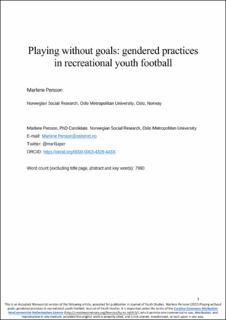Playing without goals: gendered practices in recreational youth football
Peer reviewed, Journal article
Accepted version
Permanent lenke
https://hdl.handle.net/11250/3052336Utgivelsesdato
2022-01-04Metadata
Vis full innførselSamlinger
Sammendrag
Participating in sports is a highly valued part of growing up in the Western world. This is especially true in the Scandinavian countries, where the voluntary sports organizations are closely connected to the welfare state. Paradoxically, sport is also an institution in which gender essentialism is prominent, even in gender-equal Scandinavia. Based on fieldwork in two football teams for 15-year-old girls in Norway, I explore girls’ experiences of gendered practices at different analytical levels. At the interpersonal level, gender was present in everyday interaction and how female players were understood as inferior to male players. At the structural level, such perceptions of gender-based differences were reflected in the allocation of the clubs’ resources. At the cultural level, differences were reinforced and legitimized by essentialist ideas of vulnerable, feminine girls and athletic, masculine boys. The gendered practices on the different levels mutually reinforce each other, with the consequence that girls’ participation in sport is devalued, both from the girls’ and the sport organization’s perspective. Revealing this circular process could improve our understanding of the reproduction of an essentialist gender regime in football. The findings also indicate limitations for implementing welfare policy through the gendered institution of sport.

